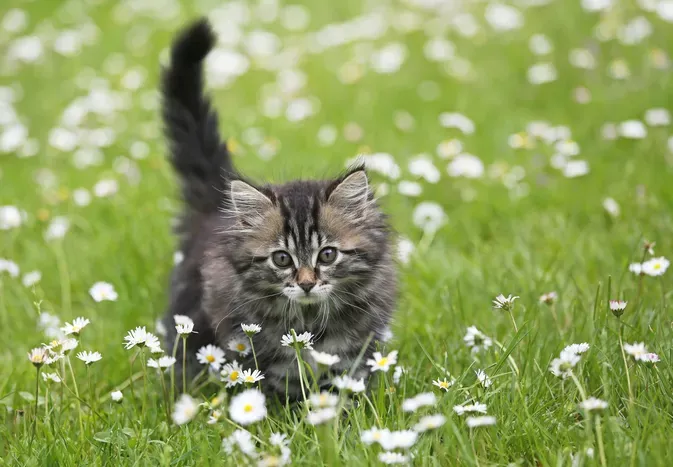Are Daisies Toxic to Cats?
Updated on 05/27/24

Are Daisies Toxic to Cats? A Comprehensive Guide to Daisy Safety for Feline Friends
As cat owners, we strive to provide a safe and healthy environment for our beloved companions. Understanding the potential hazards that lurk within our surroundings, including the plants we keep in our homes and gardens, is crucial. One such concern arises with the ever-popular daisy, a cheerful flower that adorns many landscapes. To address the question of whether daisies are toxic to cats, we embark on a detailed investigation, exploring the potential risks, symptoms, and preventive measures associated with these charming blooms.
Understanding Daisy Toxicity: Separating Fact from Fiction
Daisies, belonging to the Asteraceae family, encompass over 20,000 species, ranging from common lawn daisies to exotic varieties. While the majority of daisies are considered non-toxic to cats, there are a few exceptions that warrant attention. The culprit behinddaisy-related toxicity lies in a compound known as sesquiterpene lactones (SQLs). These compounds, found in certain daisy species, can cause gastrointestinal upset and allergic reactions in cats.
Identifying Toxic Daisy Species: Know Your Foe
When it comes to toxic daisies, two species stand out:
1. Giant Daisy (Chrysanthemum maximum): This daisy, native to the Canary Islands, features large, showy flowers in shades of yellow, white, or pink. It is the most toxic daisy species for cats, with ingestion leading to severe gastrointestinal symptoms, skin irritation, and neurological issues.
2. Dalmatian Daisy (Euryops virgineus): Hailing from South Africa, the Dalmatian daisy is characterized by its daisy-like flowers with yellow centers and distinctive purple-spotted petals. While less toxic than the Giant Daisy, ingestion can still cause gastrointestinal distress and skin irritation in cats.
Symptoms of Daisy Toxicity: Recognizing the Signs
If your cat has ingested a toxic daisy, you may observe the following symptoms:
* Gastrointestinal upset: vomiting, diarrhea, abdominal pain
* Skin irritation: redness, itchiness, swelling
* Neurological issues: tremors, muscle weakness, ataxia (difficulty walking)
* Respiratory problems: difficulty breathing, wheezing
Treatment for Daisy Toxicity: Seeking Veterinary Care
Should you suspect that your cat has ingested a toxic daisy, prompt veterinary attention is essential. Treatment will vary depending on the severity of the symptoms and the type of daisy ingested. In mild cases, supportive care, such as fluids and anti-nausea medication, may suffice. In more severe cases, hospitalization and intensive treatment may be necessary.
Prevention: Keeping Your Cat Daisy-Free
The best way to protect your cat from daisy toxicity is to keep them away from these potentially harmful plants. Here are some proactive measures you can take:
* Avoid planting toxic daisy species in your home or garden.
* If you have daisies in your yard, supervise your cat's outdoor activities and prevent them from eating the flowers.
* Provide your cat with plenty of safe and non-toxic plants to prevent boredom and curiosity-driven nibbling.
Alternative Daisy Delights: Safe Choices for Feline Friends
While certain daisies may pose a risk to cats, there are plenty of other daisy-like flowers that are perfectly safe for your feline companion. These include:
* Gerbera daisies
* Osteospermum daisies
* African daisies
* Shasta daisies
* Oxeye daisies
By choosing these safe alternatives, you can enjoy the beauty of daisies without worrying about the well-being of your furry friend.
Conclusion: Striking a Balance Between Beauty and Safety
Daisies, while often perceived as harmless blooms, can pose a potential hazard to cats if toxic species are ingested. By understanding the risks associated with certain daisy varieties, recognizing the symptoms of toxicity, and taking proactive preventive measures, you can ensure that your feline companion can safely enjoy the beauty of daisy-filled environments. Remember, a well-informed and vigilant cat owner is the best defense against any potential plant-related threats.
Explore More Pets

Cat Behavior Problems
How to Stop Aggression in Kittens

Long-Haired Cat Breeds
Siberian Cat: Breed Profile, Characteristics, & Care

Cat Behavior Problems
How to Stop Kittens From Scratching and Biting

Long-Haired Cat Breeds
Turkish Angora: Cat Breed Profile, Characteristics & Care

Basic Training
How to Socialize Your Kitten

Short-Haired Cat Breeds
Cute Pictures & Facts About Calico Cats & Kittens

Litter Box Training
Training Your Kitten to Use the Litter Box

Long-Haired Cat Breeds
10 Fun Facts About White Cats
